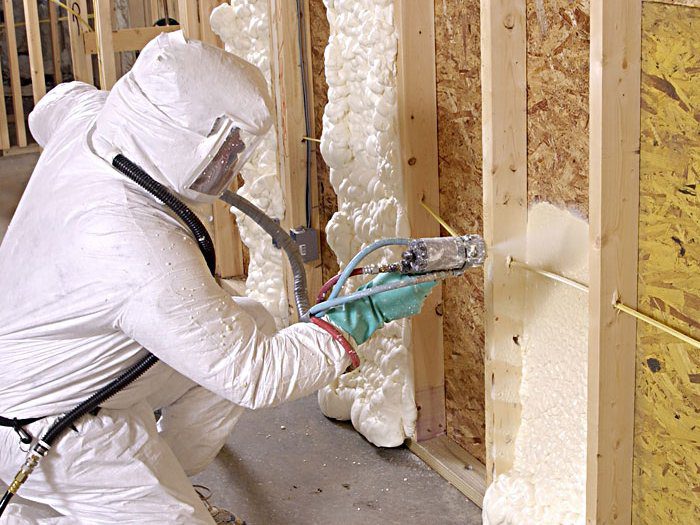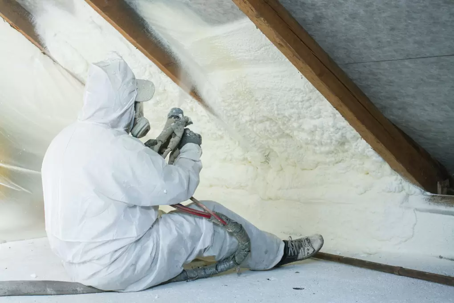How Spray Foam Can Boost Energy Efficiency in Your Home
Wiki Article
Spray Foam: The Ultimate Service for Air Sealing and Insulation
Spray foam insulation has emerged as a leading remedy for efficient air sealing and thermal insulation, providing a special mix of properties that establish it apart from standard techniques. Comprehending the full extent of its benefits, installment procedures, and comparisons with various other insulation types is important for making informed choices.What Is Spray Foam?
Spray foam is a flexible insulation product that combines the principles of air securing and thermal resistance to improve energy efficiency in structures. Made up mainly of polyurethane or various other comparable substances, spray foam is used as a liquid that increases upon contact with surface areas, creating a solid, continual layer of insulation. This one-of-a-kind residential or commercial property allows it to load voids, cracks, and gaps that conventional insulation materials might neglect, supplying a remarkable air seal.There are two major kinds of spray foam: open-cell and closed-cell. Open-cell spray foam is lighter and more flexible, using exceptional sound absorption and a reduced R-value per inch - Spray Foam. On the other hand, closed-cell spray foam is denser, providing a greater R-value, moisture resistance, and included architectural integrity to developing elements
The application procedure normally includes customized equipment, ensuring a smooth application that abides by various substratums, consisting of timber, steel, and concrete. This adaptability makes spray foam appropriate for both brand-new constructions and retrofitting existing structures. Its capacity to produce an airtight obstacle significantly contributes to lowering power consumption and improving interior air high quality, therefore making it a favored choice among house owners and builders alike.
Benefits of Spray Foam Insulation
One of one of the most substantial benefits of spray foam insulation is its outstanding ability to create a continuous air barrier, which efficiently reduces energy loss. Unlike traditional insulation materials, spray foam expands to fill cracks and voids, ensuring that air leak is significantly decreased. This characteristic not only boosts power performance however likewise leads to lower energy expenses gradually.
In addition, spray foam insulation supplies remarkable thermal resistance, adding to a more stable interior atmosphere. Its high R-value per inch enables efficient insulation in constrained areas, making it suitable for attics, walls, and crawl rooms. The moisture-resistant buildings of spray foam assistance prevent mold and mildew and mold growth, advertising much healthier living conditions.
Another vital benefit of spray foam insulation is its sound-dampening top qualities (Spray Foam). It efficiently reduces noise transmission between spaces, creating a quieter and a lot more comfortable home setting. The sturdiness of spray foam additionally attracts attention, as it does not sag or resolve in time, keeping its performance throughout its life-span
How Spray Foam Functions
Comprehending just how spray foam insulation functions is vital for appreciating its efficiency in air sealing and thermal resistance. Spray foam insulation includes two primary components: isocyanate and polyol material. When these parts are blended, they go through a chemical reaction that causes the material to expand rapidly, creating a dense foam that loads splits, tooth cavities, and spaces.As the foam expands, it sticks to surfaces, developing an impermeable seal that dramatically decreases air infiltration. This characteristic makes spray foam insulation highly efficient at avoiding drafts and wetness penetration, which can result in energy loss and damage gradually. In addition, the closed-cell version of spray foam offers superior thermal resistance as a result of its rigid framework, successfully decreasing warm transfer.
The one-of-a-kind residential properties of spray foam permit it to adjust to uneven surfaces, guaranteeing thorough coverage and a smooth obstacle. Therefore, spray foam insulation not only improves power effectiveness however likewise adds to enhanced interior air high quality by decreasing the build-up of contaminants and irritants. Ultimately, understanding the mechanics behind spray foam emphasizes its function as a superior option for insulation and air securing in both household and business applications.
Installation Refine Introduction

Prior to installment, the room should be sufficiently cleansed and prepped, ensuring that surfaces are devoid of debris, wetness, and dirt. This action is critical due to the fact that pollutants can jeopardize bond and overall performance. As soon as the location is prepared, the application entails blending the two components of the spray foam, which expands upon get in touch with and fills spaces effectively.
Educated professionals ought to perform the installment, utilizing specialized equipment to guarantee consistent coverage and optimum thickness. Safety precautions, including using safety gear and making sure appropriate air flow, are necessary throughout this procedure. After application, the foam generally treatments swiftly, forming a solid barrier that improves power effectiveness.
Comparing Spray Foam to Standard Insulation
When reviewing insulation choices, spray foam insulation stands out in contrast to traditional products such as fiberglass and cellulose. Unlike fiberglass and cellulose, which check these guys out can allow air infiltration, spray foam expands upon application, filling up crevices and voids to develop an impermeable seal.Furthermore, spray foam gives a greater R-value per inch than conventional insulation types, offering more effective thermal resistance in a thinner account. This characteristic is especially advantageous go to website in spaces with limited tooth cavity deepness. Spray foam is immune to wetness and mold and mildew growth, which can be a significant problem with cellulose and fiberglass, particularly in moist settings.
However, spray foam insulation normally brings a higher ahead of time expense than its standard equivalents. Home owners should evaluate this initial investment versus long-term energy financial savings and performance benefits. Ultimately, while both insulation types serve their function, spray foam emerges as an extra sophisticated option for modern-day insulation requirements, specifically in regards to air sealing and thermal efficiency.

Final Thought
In recap, spray foam insulation represents an extremely reliable remedy for accomplishing ideal air securing and thermal resistance. Its distinct properties, including moisture resistance and noise dampening, make it ideal for numerous applications in both brand-new buildings and retrofitting jobs (Spray Foam). The initial expenses may be greater compared to traditional insulation materials, the lasting benefits, such as considerable energy financial savings and enhanced indoor air top quality, justify the financial investment and highlight its worth in contemporary building techniques.Spray foam insulation has actually emerged as a leading option for effective air securing and thermal insulation, providing a distinct mix of buildings that set it apart from typical techniques.Spray foam is a functional insulation material that incorporates the principles of air securing and thermal resistance to improve power efficiency in structures.When evaluating insulation choices, spray foam insulation stands out in contrast to standard products such Resources as fiberglass and cellulose. Eventually, while both insulation types serve their objective, spray foam emerges as a much more advanced service for contemporary insulation needs, especially in terms of air securing and thermal efficiency.
In recap, spray foam insulation stands for a highly efficient option for attaining optimum air securing and thermal resistance.
Report this wiki page